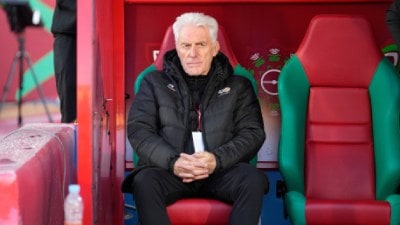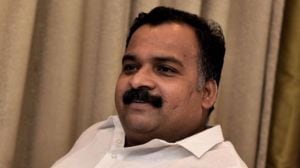Working the deluge
Tanaji Kumbhar pumps out rainwater from the waterlogged roads to keep Mumbai running during its infamous monsoons
Around 5 a.m.,Tanaji Kumbhar begins his day in a 300 sq ft room he shares with five other men near the Railway Colony quarters at Matunga. He rolls out a dozen chapattis,packs a roti-sabzi tiffin for two of his roommates and himself,and walks for 15 minutes to reach his workplace at the Hindmata Junction at Dadar East.
A farmer from Kolhapur,Kumbhar works at the dewatering pumping station at Hindmata Junction,a low-lying area the civic body identifies as a chronic flooding spot during the rains. From 8 a.m. to 4 p.m. every day for four months or so,the Hindmata flyover shelters him from the scorching sun and light rain. However,this concrete umbrella fails to provide much solace in torrential downpour.
Kumbhar is one of the foot soldiers of the Brihanmumbai Municipal Corporation who keep the city running during Mumbais infamous monsoons. He has eight co-workers,and each of them gets Rs 8,000 a month. The nine of us work in shifts of three. For a weekly off,the team is divided into two,and we take turns for a Sunday or Monday holiday, he said. There are 230 such pump stations at 189 locations in the city. From May 25 to October 15,unskilled workers from across Maharashtra,and even other states,come to work at these stations.
The pumping machine has a silver pipe with a radius of at least one metre emerging from a storm water drain inlet on the roadside. It connects to a 10-foot-high pump. On the other side of the pump,a thick green pipe is attached which runs along the pavement for a few feet before burying into the road. Three hundred metres away,a similar contraption supports the dewatering exercise in times of extreme water-logging. Pointing to the silver pipe,Kumbhar says,With this we pump out excess water which is then transferred through the green pipe to the main drains of the city.
In May,officials of the Storm Water Drains Department said the junction was unlikely to flood this year as the de-silting in the area was completed in time. However,the last three months proved them wrong. The problem is,this is a low-lying area. When the sea is at high tide,even opening the manholes or pumping out water from one drain will not help until the sea level drops, explains Kumbhar,who has also worked at the pump stations at Dharavi,Dhobi Ghat and Vile Parle.
On September 3,when Mumbai had its wettest day so far this season,Kumbhar stood for 15 hours working the dewatering pumps. The men on the next shift could not make it here in time as it was raining too heavily so we stayed back. We started the drain around 5.30 p.m.,and it was turned off only at 12.30 a.m. I left at 11 pm because the men on the next shift managed to reach the site earlier, he says. While the pump runs,men must monitor it,heavy downpour notwithstanding. This means we sometimes have to stand for eight hours at a stretch at the same place. Occasionally,with the pressure of the water,the pipe might break off from the machine so we have to fix it again, he says. When a car drives by in this water,a current is created so we have to hold on to something to prevent ourselves from falling into the water.
This year,there have been fewer days of downpour. On days when there is no rain,we run trials on the machines for 15 minutes at the start of every shift. After that we sit here and wait for the rains, Kumbhar says. My farm in Kolhapur has received good rain. The clouds seemed to have missed Mumbai this year. The city needs a good rain. It doesnt matter if I have to stand here for the whole day but Mumbai needs good rain. Else,it gets too hot and the people are troubled even more, says Kumbhar,who first came to the city in 1993.
Soon after the 93 riots,when I was 15,I boarded a train to Bombay with a friend. I wanted to see what this city was all about. I stayed here doing odd jobsa few years at a bakery,a couple of others as a courier serviceman for a big company, Kumbhar says. Since 2006,his visits to Mumbai have been cut down to a few months every year. My elder brother works permanently in a bakery at Panvel and my younger one does construction work at a town in Kolhapur. When my mother and father were alive,I could dream of coming here and finding a job,but now that they have gone,I have no choice. Someone needs to tend to the farm along with my wife and my brothers family, he says.
This is a good job. During the rains,there is no work on the field so it is better to come here and earn some money. Anyway,there is nothing left for me here now. I am not very educated,and at this age,I am not going to find a great job. I might as well go back to my family and make a life where I was born, Kumbhar says.
- 01
- 02
- 03
- 04
- 05































